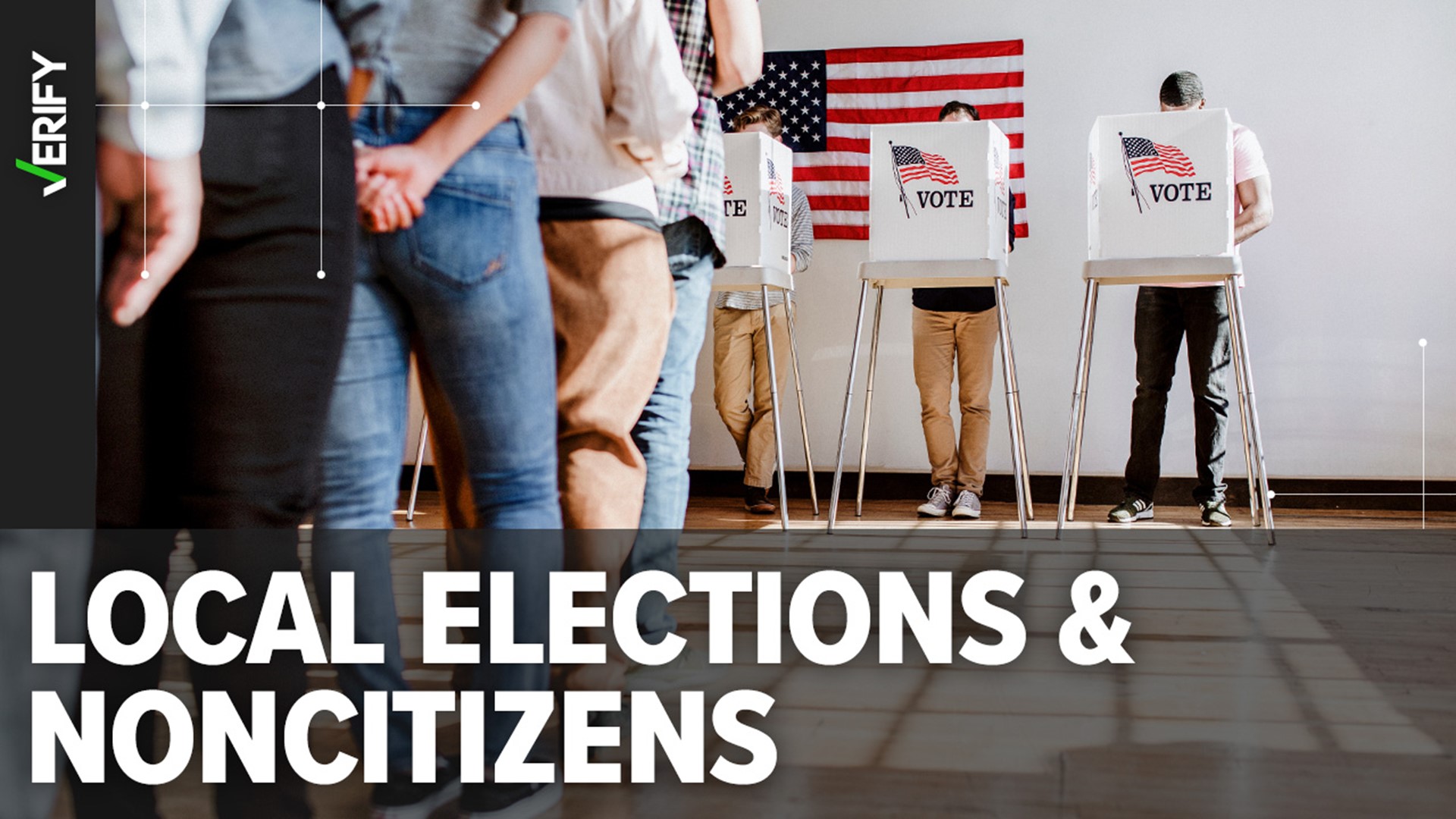There won’t be a nationwide federal election in 2023, but voters will still be able to cast ballots for local and state elections on this year’s upcoming Nov. 7 election day.
After we VERIFIED that federal law prohibits undocumented immigrants from voting in federal elections, some VERIFY readers asked if they are allowed to vote in local elections.
One viewer texted: “Can [undocumented immigrants] vote in local, non-federal elections?”
THE QUESTION
Are undocumented immigrants allowed to vote in some local elections?
THE SOURCES
Ballotpedia, a digital encyclopedia of American politics and elections
VERIFY analysis of various local laws and town charters
2017 paper by Joshua Douglas, an election and voting rights expert who teaches at the University of Kentucky Rosenberg College of Law
THE ANSWER
Yes, more than a dozen municipalities allow undocumented immigrants to vote in some or all local elections.
WHAT WE FOUND
Federal law does not prohibit noncitizens, including those who are undocumented and not authorized to legally live or work in the U.S., from voting in local or state elections.
While no states grant undocumented immigrants the right to vote in state elections, more than a dozen municipalities nationwide allow undocumented immigrants to vote in local elections.
U.S. code makes it illegal for any non-citizen to vote for federal office, including for president, vice president, the Senate and the House of Representatives. However, federal law specifies that non-citizens are allowed to vote for other offices if they’re allowed to “under a State constitution or statute or a local ordinance.”
No state grants noncitizens the right to vote in statewide elections, such as those for governor, according to USA.gov. But many state constitutions don’t explicitly prohibit local governments from allowing noncitizens, including undocumented immigrants, to vote in local elections.
“Municipalities can expand voting rights in local elections if there are no explicit state constitutional or legislative impediments and so long as local jurisdictions have the power of home rule,” wrote Joshua Douglas, an election and voting rights expert who teaches at the University of Kentucky Rosenberg College of Law, in a 2017 paper.
Ballotpedia, a digital encyclopedia of American politics and elections, lists 17 municipalities that currently have laws allowing at least some noncitizens to vote in local elections. Noncitizens include people with legal authorization to live or work in the U.S., as well as people who are undocumented.
VERIFY confirmed that the language of 13 of these municipalities’ laws includes undocumented immigrants among the noncitizens allowed to vote. The other four allow some noncitizens to vote, but not undocumented immigrants.
These municipalities include San Francisco and Oakland in California, Washington, D.C., and 10 communities in Maryland. All 10 of the Maryland communities are within the two counties that directly border Washington, D.C.
Some of these municipalities, such as San Francisco and Oakland, only allow their undocumented residents and other noncitizens to vote in local school board elections, and only if they are parents of children attending the local school district. Others, such as Washington, D.C., allow noncitizens to vote for offices such as mayor and council member, as well as on referendums.
Oakland’s law directly franchises undocumented immigrants by defining noncitizens as “documented immigrants, lawful permanent residents, residents on work visas, and undocumented immigrants.”
Many of the other laws don’t directly name undocumented immigrants, but extend the right to vote broadly enough to include them. For example, Chevy Chase Section 3, Maryland, defines “qualified voter” as “any person who is a resident of Chevy Chase Section 3, without regard to citizenship, and is at least eighteen (18) years of age.”
While the city doesn’t allow them to vote in elections for citywide offices, Chicago allows undocumented immigrants to vote in what it calls local school councils, which serve as the governing bodies for individual schools. Students can also vote in these elections, of which there are 477 in the city.
A few other cities nationwide allow noncitizen, legal residents to vote, but not undocumented immigrants. For example, Montpelier, Vermont, specifies a person must be a legal resident of the U.S. to register to vote.
New York City was, for a time, among the cities that allowed “lawful permanent residents” to vote, but did not extend that right to undocumented immigrants. However, the law has since been blocked by a state court.
Many noncitizen voting laws, whether inclusive of undocumented immigrants or strict to legal residents, face legal challenges upon their passage. The California Court of Appeal sided with San Francisco against a legal challenge to stop its noncitizen voting law in August 2023, and Washington, D.C.’s law is currently facing a challenge in court.
This story is also available in Spanish / Lee este artículo también en español: Inmigrantes indocumentados pueden votar en elecciones locales en algunas municipalidades

